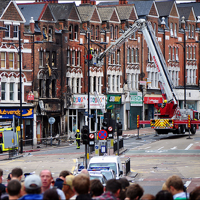Amid the anxiety and devastation of the London riots, there was one brief comic interlude, when the government of Iran urged British authorities to use restraint in dealing with protesters. The appeal was bitterly amusing, of course, because of the brutal tactics Tehran used to put down protests in 2009. Police in London managed to end the rioting using traditional crowd-control methods. But then, in the wake of a public outcry over the disturbances and the disappointing performance of the police, British Prime Minister David Cameron made a highly controversial proposal: Next time, he suggested, the government might choke off access to the Internet, something Iran also tried in 2009.
As in Iran in 2009 and throughout the Arab world in recent months, those taking to the streets of London used social media as a key organizing tool. With evidence mounting about the role of new communications technologies in the riots, Cameron told Parliament that his government was exploring the possibility of selectively banning individuals from using social networks such as Facebook and Twitter if they used them to organize illegal activities. The remarks echoed a number of proposals in other major democracies to control Internet access for the sake of public safety.
As elsewhere, Cameron's idea unleashed a storm of emotional debate, and the proposal's ultimate fate is still unclear. But it brought to the fore a question that will continue to emerge in democratic societies as social media become more sophisticated and as its users apply them more frequently and more effectively to promote activities the authorities, or parts of society, consider objectionable: Can authorities in a democratic society infringe on the people's right to communicate via social media?

